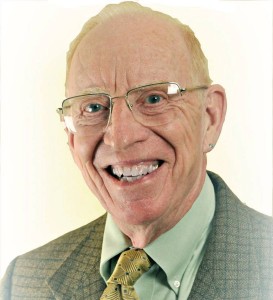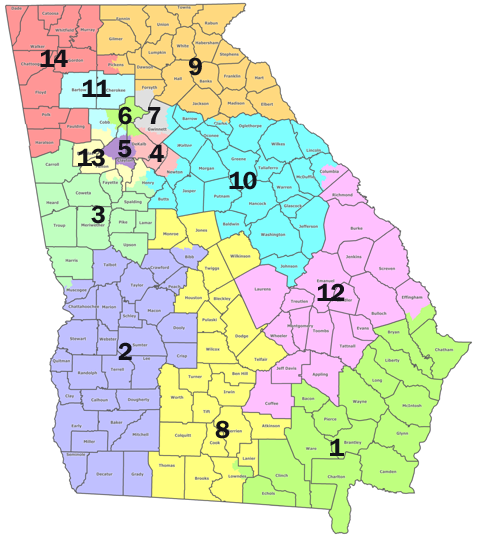
An Interview with Georgia District 9 Candidate, David Vogel
By: Shalin Jyotishi
The Georgia primaries officially ended on May 20, and, subsequently, a series of intense runoff and general elections. Here in Athens, citizens finished their own highly contested mayoral debate. However, Athenians, like many Georgians, still have some decisions to make in November. Athens is represented by two congressional districts by congressional districts nine and ten. As the Classic City begins its sleepy summer months, new races have blazed in northern Athens and the rest of Georgia’s 9th district.
District 9 incumbent, Doug Collins (R), a lawyer and former army chaplain, is a fairly moderate Republican congressman compared to his counterparts. Ideologically, Collins sits to the left of Paul Broun (GA-10), Jack Kingston (GA-1), and Phil Gingrey (GA-11) – all of whom are running for retiring senator Saxby Chambliss’s seat in the U.S. Senate. Despite being a moderate conservative, Collins has been representing one of the most conservative districts in the Eastern Time Zone.
Collins is being challenged for his House of Representatives seat by physicist, teacher, and social organizer, David Vogel (D). Vogel has spent the majority of his career as a teacher. He has lived abroad and boasts a platform against “slogan usage.” He has a website separate from his campaign website called noslogans.org which advocates the use of “evidence-based policy.” A political outsider, the California-native previously ran an unsuccessful race for Georgia House of Representatives (District 33) against Republican incumbent Tom McCall. Despite only winning 28.3 percent of the votes, Vogel won 10 percent more votes than the last Democrat to run in District 33. As for District 9, it’s been nearly 15 years since a Democrat held the house seat. No Democrat has held district 9 since Nathan Deal switched parties during the 1995 Republican Revolution.
Now Vogel aims to replace Collins as house representative of Georgia’s 9th district. To learn more, I sat down with Dr. David Vogel, Democratic candidate for district 9.

GPR: What makes you qualified to represent Georgia’s 9th district in the U.S. House of Representatives?
I’m a math-head by nature. I have the training needed to understand the arithmetic behind policy. I’m afraid we don’t have very many people in office who are able to understand policy, because [policy] is a quantitative issue not just a slogan fight.
GPR: You received your PhD in Physiology and Biophysics from the University of Iowa and during your fellowship at Johns Hopkins University, you discovered an interest in math education. As a teacher, scientist and aspiring congressman what are your thoughts on scientific research funding in the United States? Do you support the FIRST Act proposed by the House Committee on Science?
The question about how much funding given to science is appropriate, but [in regards to the FIRST Act] what to fund is not an issue that can be answered quantitatively. Being a scientist, I think science is underfunded. A bigger issue for me is congressional meddling in funding. Republicans have stopped funding social sciences now, and I suppose that’s because they don’t want the answers. There’s meddling in science to make it relevant to capitalism. When you try to push [science] it doesn’t work very well. If we had these policies in the 18th and 19th centuries that said science had to have some clear application down the road, then [science] would have died. Electricity wouldn’t have been studied. It didn’t have any clear application when we were shocking monks by surprise. [Laughs] Science needs to be a matter of answering questions scientists are concerned about. If politicians are able to say to focus on one question as opposed to another, progress is going to be poor.
GPR: Given your background in teaching, what is your stance on Common Core?
I happen to not like Common Core. However, it’s not a local control versus federal control issue. Sometime in the past, we decided to create the Department of Education. We assumed the people who worked there knew something about education. Frankly, when I read the Common Core standards, I think I’m reading something that was written by experts in a field in which nothing is known. I have three teenagers home. None of them can add fractions. They are studying imaginary numbers. That’s something that may come in handy in the third year of college if they happen to be physics majors, in which case they can learn all there is to know about imaginary numbers in 20 minutes rather than spending a month on it in grade school. They don’t know what imaginary numbers might be for. I think education in the hands of “educationists” is a big mistake. I think ordinary classroom teachers often know more about teaching than the people who are telling them what to do. Even if Common Core was a good plan, it’s going to get botched because teachers don’t like it.
I would also like to see STEM (Science Technology Engineering and Math) education in the hand of practitioners. If you talk to people who do math well, they tell you to get the calculators out of the classrooms because students need to be able to see relationships between the numbers that are needed when they go to more advanced subjects. I know medical students who don’t know long division or their long division tables. It’s shocking.
GPR: Your campaign has heavily focused on income inequality and the concentration of wealth in the top .01 percent of the population. What do you hope to do to address this issue if elected to congress?
I hope to educate congressmen who have a bigger stage to play on than I do. I want to help people to start understanding the future of wealth inequality. People are starting to talk about wealth inequality, but nobody is focusing on the future of it. The future is really scary. If there isn’t any change, all of the wealth is going to be in the hand of the teeny-tiny fraction of Americans in just a few years. That evidence is clear. We need to have tax policies that relieve those people some of their money. For me, it would be a highly progressive tax, the kind we had in the 1950s. I’d also be willing to look at something that included a fair tax approach for most Americans but add in a wealth tax for the super rich. It makes people angry, but you cannot stabilize wealth inequality without a wealth tax.
GPR: What is your stance on climate change?
It’s been over 20 years since I met a scientist who wasn’t convinced that climate change was coming. When you hear climate change deniers talk, they always wind up saying the scientists pushing climate change are only doing it to get grant money to fund their operations. Most people do not understand how science works. Scientists are very intolerant of bad data. Every journal looks for it all the time. When a scientist gets caught fudging data, it’s the end of his science career. Even if he’s well-known. For a large enterprise like climate change, for climate change to be a fraud is just unthinkable. I’d like to see us engage the rest of the world in adapting to climate change. It’s coming, we need to adapt to it. I’d like to see the Environmental Protection Agency(EPA) left alone. Conservatives think EPA regulations are a horrible burden on the economy. Pollution is a horrible burden on the economy. In Hong Kong, the air pollution produces 5,000 deaths a year and billions of dollars in economic losses to one city. We don’t have the data on Beijing, but it’s worse than that. Think about Los Angeles before the EPA. The United States has a 40 year [industrial] head start on China. Without the EPA, most of us would be dead.
GPR: You lived abroad for a number of years. What is your stance on immigration policy?
At the moment, I have a Guatemalan kid who’s 19 years old living in my house. Two years ago his parents couldn’t manage the Great Recession and went back to Guatemala. He wanted to finish schooling here, so we let him stay with us until he graduated high school. Emotionally, I understand the “Dreamers.” My own wife and stepson are naturalized citizens. They’re from Brazil originally. That being said, there is still a problem with population growth in the United States. We can’t allow everyone into the United States. America has a reputation for being a richer place than it is. Immigrants can’t find their way out of poverty the way they could 30 years ago. I would vote for bills that would reduce the chain of immigrants to the US, but I would also vote for path to citizenship for people who are here and well-established illegally.
Vogel faces an uphill battle this fall. Incumbent Doug Collins won 80.2 percent of the 2014 primary votes beating challenger Bernard Fontaine. In 2012, he won 76.2 percent of the votes. He sits on a war chest of $565,150.68. However, Vogel remains optimistic that his campaign may prove useful in building democratic infrastructure for future campaigns as well as state campaigns.

